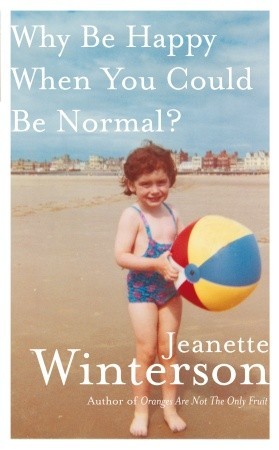“When I am with her I am happy. Just happy.”
She nodded. She seemed to understand and I thought, really, for that second, that she would change her mind, that we would talk, that we would be on the same side of the glass wall. I waited.
She said, “Why be happy when you could be normal?”
Right from the first lines of Why Be Happy When You Could Be Normal, I had to recognise that I was in the hands of a master storyteller: Everything about Jeanette Winterson's voice and craft are engaging, thoughtful, and wise. It doesn't hurt that in this, her memoir, Winterson has a wild story to tell – of an unstable adoptive mother and her weak-willed husband; of abuse and neglect and the sense of something missing that all adopted children (apparently) feel; of redemption through literature; of a final family rift when Winterson came out of the closet; a descent into madness and the love that pulled her out again – and I was fascinated on every page; wanted to mark too many passages as significant. The only Winterson I had read before was The Gap of Time – a retelling of The Winter's Tale in the Hogarth Shakespeare Series, which didn't impress me much (Winterson uses the phrase “Time is a gap” in this memoir, which I thought made it an extra significant personal philosophy for her, until I realised that she must have been writing these two books at about the same time) – and based on that one experience, I wasn't excited to pick her up again. After reading Why Be Happy, I am excited to read the fiction that was forged in this life.
I never believed that my parents loved me. I tried to love them but it didn't work. It has taken me a long time to learn how to love – both the giving and the receiving. I have written about love obsessively, forensically, and I know/knew it as the highest value.For the most part in this account, the author refers to her adoptive mother as “Mrs Winterson”, and that about says it all. The Wintersons were born-again Pentacostals who went to church daily, and despite her mother not adhering to all of her church's beliefs (she secretly smoked despite it being forbidden, she refused to believe in the resurrection of the body after the End Time), when she suspected Jeanette of having a girlfriend as a young teenager, Mrs W brought in the Church Elders to beat and starve and exorcise the demon out of her daughter. Jeanette was routinely locked out of the house at night as a little girl, her father was bullied into caning her for minor infractions, and her mother swore that the Devil himself led her to the wrong crib when she was choosing a baby to adopt. Jeanette was poor and hungry and always cold; but so was everyone else she knew in her workingclass suburb of Manchester. Despite being forbidden to read books outside of the Bible (and this despite Mrs W devouring murder mysteries), Jeanette developed a love of language that led her to attempting to read the entirety of her local library's collection of “English Literature A-Z”. Ultimately, it was poetry that pierced through to her soul.
I loved God of course, in the early days, and God loved me. That was something. And I loved animals and nature. And poetry. People were the problem. How do you love another person? How do you trust another person to love you?
I had no idea.
I thought that love was loss.
Why is the measure of love loss?
When people say that poetry is a luxury, or an option, or for the educated middle classes, or that it shouldn’t be read at school because it is irrelevant, or any of the strange and stupid things that are said about poetry and its place in our lives, I suspect that the people doing the saying have had things pretty easy. A tough life needs a tough language – and that is what poetry is. That is what literature offers – a language powerful enough to say how it is.The rest of Winterson's story is equally engaging – living in her car in order to keep attending school after her mother kicked her out; getting into Oxford; having her first novel, Oranges Are Not the Only Fruit, win awards and be adapted for television; enjoying a successful career under the shadow of something missing that ultimately breaks her mind and ruins her relationships; beginning the search for her birth mother – and throughout it all, she relates the facts of her life to the writing it inspired, as well as the literature that inspired her. This isn't a long book, but it contains an entire, remarkable life.
It isn’t a hiding place. It is a finding place.
Reading things that are relevant to the facts of your life is of limited value. The facts are, after all, only the facts, and the yearning passionate part of you will not be met there. That is why reading ourselves as a fiction as well as fact is so liberating. The wider we read the freer we become. Emily Dickinson barely left her homestead in Amherst, Massachusetts, but when we read 'My life stood – a loaded gun' we know we have met an imagination that will detonate life, not decorate it.Why Be Happy detonates life, and I was enthralled on every page; these facts may not have been relevant to my own life, but I somehow met myself here. I'm certainly looking forward to reading Winterson's fiction.

